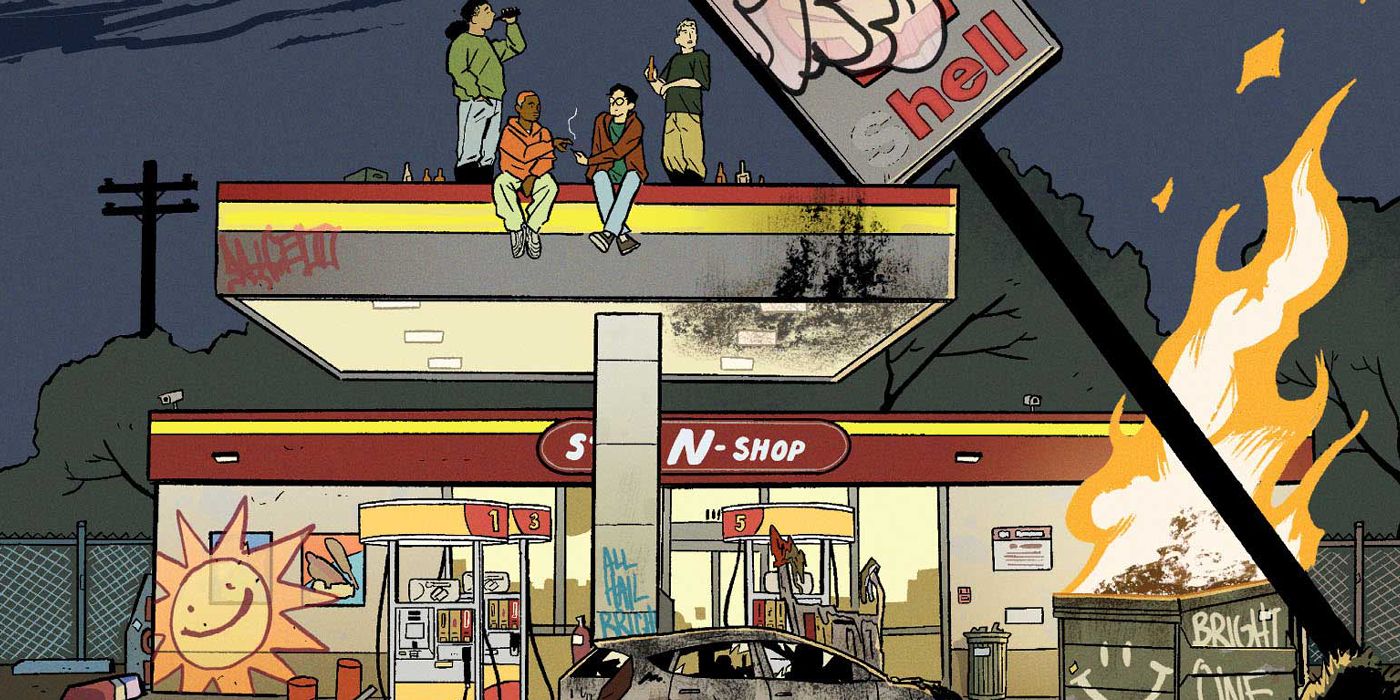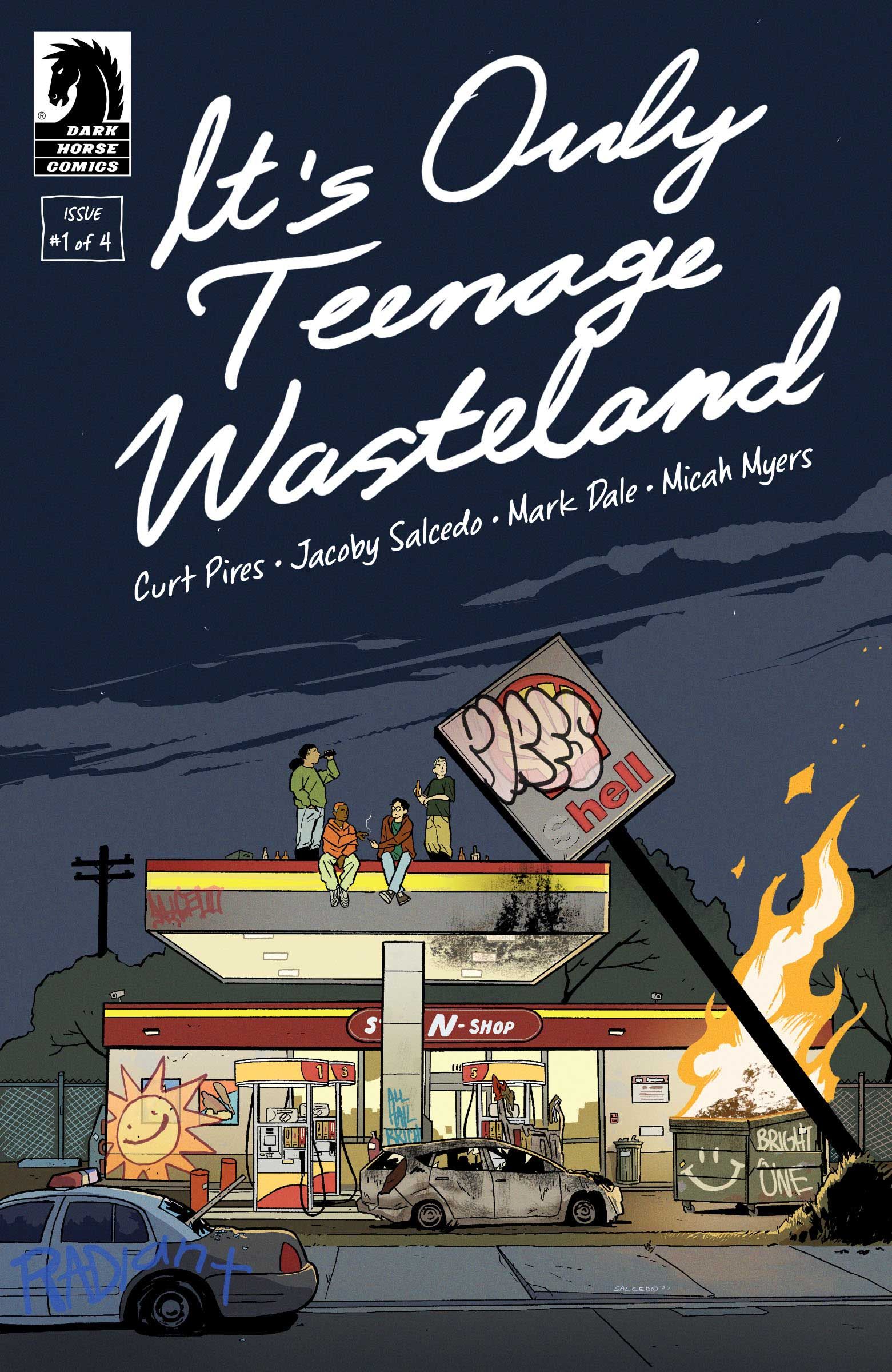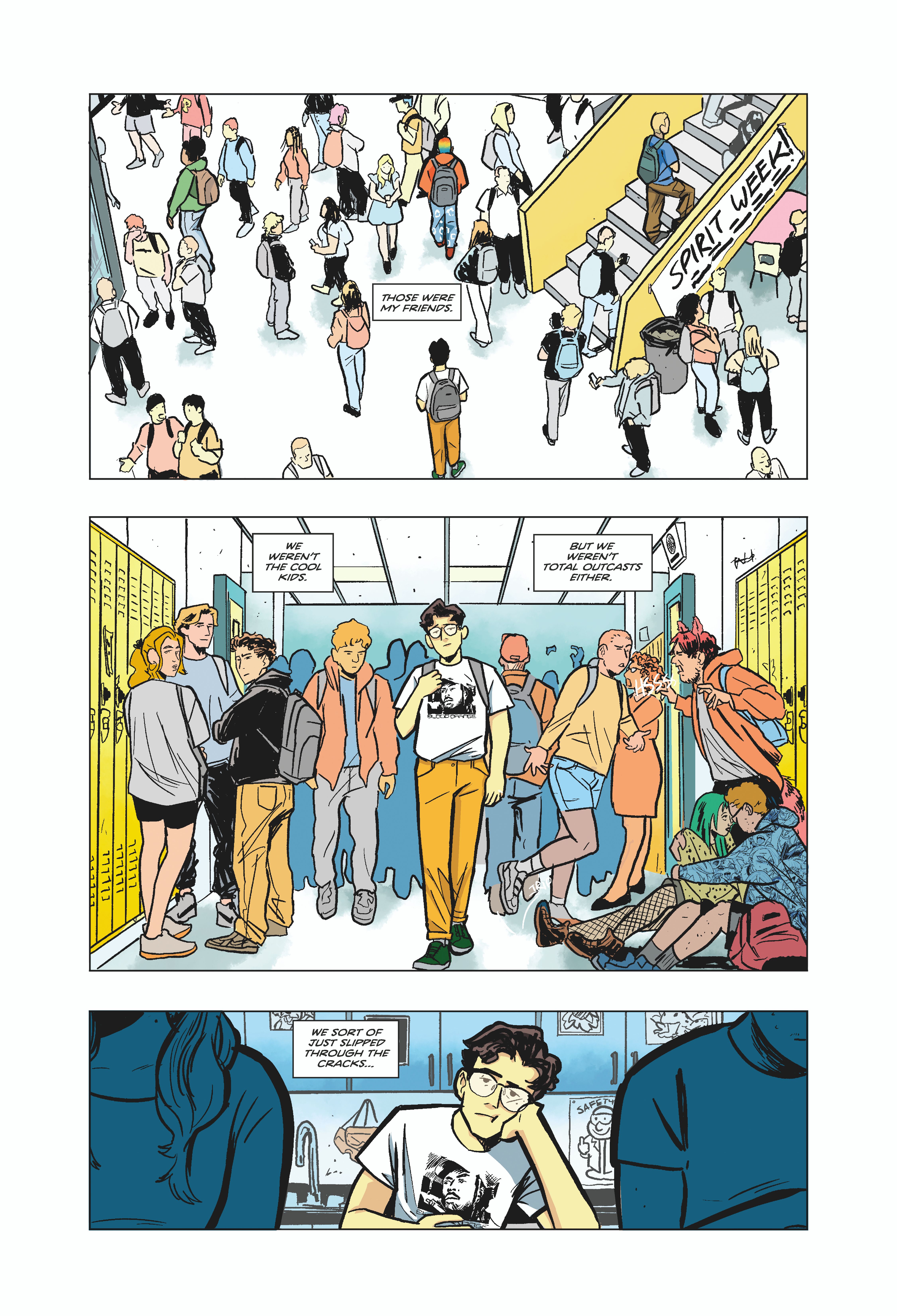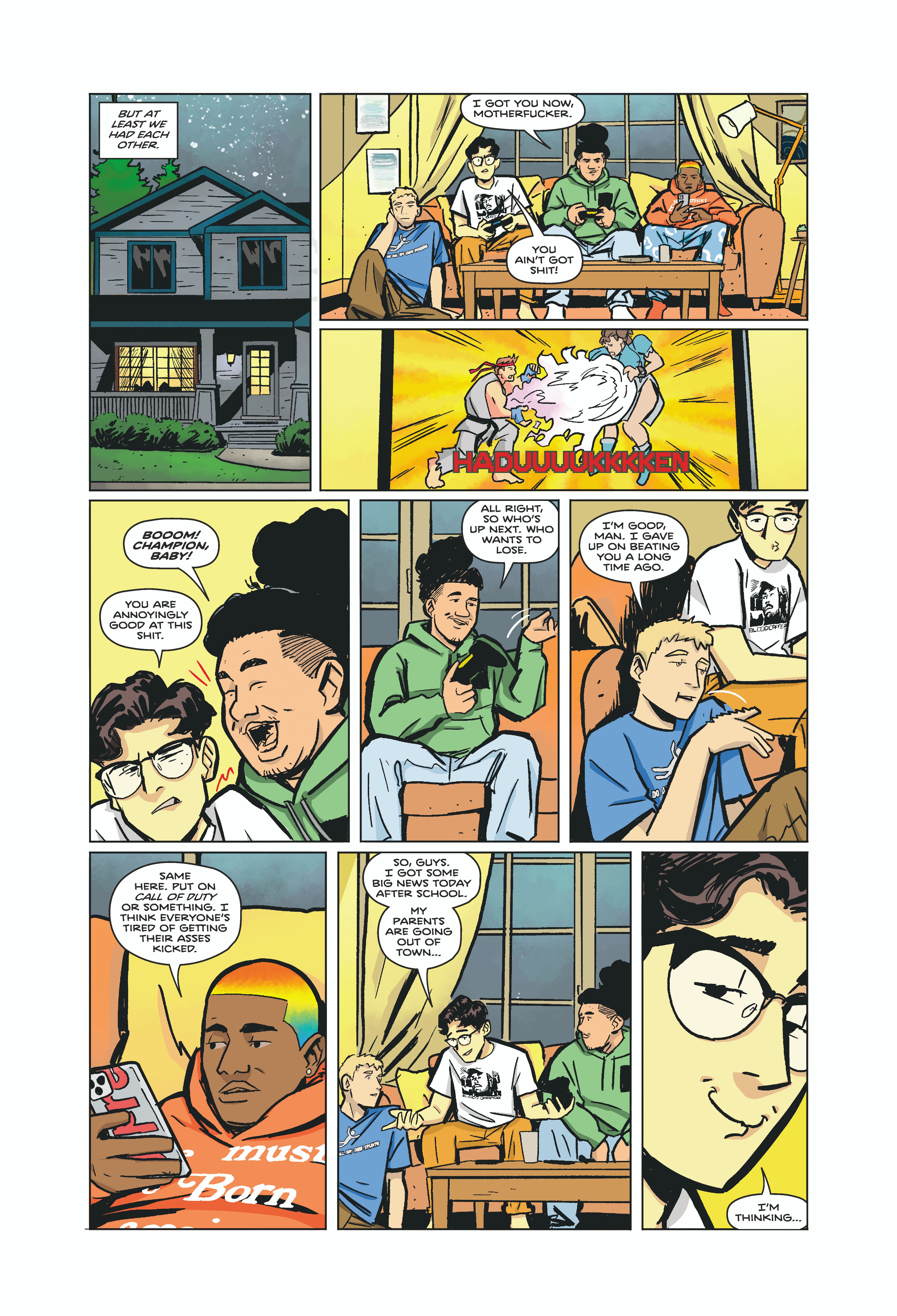Over the years, Curt Pires has earned a reputation for writing thoughtful, genre-bending comics. Between sci-fi series like The Tomorrows and his coming-of-age story, Youth, the prolific author has introduced readers to countless characters in all manner of entertaining situations. Now, he is teaming up with artist Jacoby Salcedo and colorist Mark Dale for It's Only Teenage Wasteland, a new four-issue miniseries from Dark Horse Comics.
It's Only Teenage Wasteland #1 follows Javi and his friends as they navigate the highs and lows of high school. When Javi's parents go out of town, he convinces his sister to let him throw a party, but no amount of planning could possibly prepare them for what happens next. CBR spoke with Pires about his collaboration with Salcedo, crafting a sci-fi teen comedy, and how this series compares to Youth. Pires also discussed some of the other stories he looked to for inspiration and his long-time relationship with Dark Horse Comics.
CBR: Could you talk a little bit about the origins of It's Only Teenage Wasteland?
Curt Pires: It's really two factors in the creation of the series. Jacoby and I wanted to work together for a while. We've been juggling a few ideas, and I'm pretty picky about what I work on and what I put out because I have a pretty high bar for myself. I want anything I put out to be able to stand alongside the best books on the stand. So Jacoby and I had a couple of things we talked about doing that we pulled back on because I didn't think that the ideas were fully cooked on my end. It's Only Teenage Wasteland came about because I've been fascinated with combining elements of comedy and genre, which I think is something that's not done very often in comics, or even in media in general -- this idea of combining really comedic stuff with cool sci-fi elements.
Initially, I had been conceiving of this idea with characters who were a bit older. Then I got to thinking, and through reflecting on the teen movie genre and some of the great teen comics, [I thought] this idea would work really well fusing this Superbad, Booksmart kind of narrative with this big end-of-the-world sci-fi stuff that you see in like The Walking Dead, or The Last of Us, or many other great things like Lost. So that's where the real origin of the book is.
How did you and Jacoby start working together? Is this your first big collaboration?
So this is our first one. I think we just followed each other on Twitter or something, which is really one of the redeeming qualities of Twitter that you could still find amazing artists like Jacoby out there amidst all the hatred and other terribleness on there. But we'd followed each other for a while. He had been a fan of this book, Youth I did at Comixology and Dark Horse. We wanted to work together, and we began spitballing ideas. It took a while, and I'm grateful for his patience with me. But eventually, we ended up on this one. Once I had the idea, I was like, "Okay, Jacoby is the perfect artist for this book." I brought it to him, and he was very intuitive. We've had a really close collaboration and a lot of back and forth. So I'm really grateful for his partnership.
In the Dark Horse solicitation, you describe the series as a spiritual sequel to Youth. Could you elaborate a little bit on that?
What makes Youth so great is it combined a mature team drama, like an A24 movie or even something like Euphoria, with the superhero genre. So again, it's this alchemy of the dramatic, more humanistic drama with the larger-than-life superhero narrative. In the same way that Youth combined this very grounded narrative with the superhero, It's Only Teenage Wasteland does that teenage story with a bit more comedy with the big sci-fi mystery box JJ Abrams thing or whatever. So they're linked like that.
If Youth is me exploring the stuff of my late teens and early 20s growing up, and while you're a young adult, you're a grown-up, but you're not really grown-up -- [then] I think It's Only Teenage Wasteland was me really going back and reflecting on my high school years where I didn't particularly have a great time and mining my really close friendships and reflecting on that. It wasn't a great period of my life, but I still look back on my time with my friends really warmly and fondly, and there's a real sweetness to that. So I think that's combining with the genre stuff.
Were there any specific either teen comedies or sci-fi stories that you looked to for inspiration while you were working on this?
I think Superbad is hilarious, and the way those characters riff on each other is pretty funny. I wasn't super consciously watching Superbad and being like, "I'm gonna do this," but I wanted there to be a level of humor between the characters that would almost feel at home in that early 2000s sweet spot when Judd Apatow was making those great films. [In] Issue #3, we pretty clearly name-check Lost, and the characters are talking about how "This is some Lost bullshit." So that one we wear on our sleeve. I love big mystery storytelling, but combining that with the levity of comedy gives you something really enjoyable because you're having your cake and eating it too. A lot of those mystery shows get so serious at points that you lose a bit of heart if you're not careful. So this is really trying to combine what I love about these two modes of storytelling.
I love the title. Was The Who's "Baba O'Reilly" something that you were thinking about while making the story? Or did it just click as a title?
Yeah, it kind of clicked as a title because -- I don't want to spoil too much about the twist ending -- but there are the metaphorical elements of the "Teenage wasteland" and the literal events we encounter as we go through the story. So I thought it was a fitting title. It's kind of funny because I don't really like doing long titles for books. I feel like now every book has such long titles, right? I joked about it, that this creator who I came up with and was like a pal to me was Matt Rosenberg, and he used to be the only one doing that. So I was joking to him before that everyone owes him royalties when they do the long title, but I'm not paying. So if I could shorten the title, I would, but I think there's there's been other books called similar things. So I wanted to be respectful. So what's the long title -- the Matt Rosenberg version of it, I guess?
Yeah, I guess What's the Furthest Place From Here? is probably one of the longest titles on the stands right now.
Even almost like 10 years ago, at this point, We Can Never Go Home. I think he did it because he thought it was funny. I guess long titles are more prominent in literature and stuff like that, but it's funny to me. Everyone is doing these long titles now.
In addition to the title, there are a lot of great musical references sprinkled throughout Issue #1. You've got the BADBADNOTGOOD poster on Javi's wall, and he's wearing the Blood Orange shirt. Were details like that something you put in the script or was that something that Jacoby added? How did you two work together to build the world?
Yeah. Credit where it's due -- most of that is Jacoby. One thing that Jacoby and I have in common is a love for music, streetwear, and youth culture. That's one of the things that, I think, made him want to want to work with me when he read Youth -- all the music stuff in there. But when we were working on this, he definitely went in and added so much stuff. It brings a lot to the book.
On a similar note, you guys do some cool design stuff in this issue with the gutters being different sizes depending on the speed of the page and all sorts of really subtle visual cues to play with the rhythm of the story. Was that mostly Salcedo, as well, or were you designing each page in the script? How do you two share those duties?
That was a bit more collaborative. One thing I really wanted to have in the book was the title card stuff. I wanted to have a visual or design shorthand that short circuits the visual language of comics because I feel like there are some really well-designed comics, but they're few and far between. That just immediately sets the story out. In terms of some of the paneling and the gutter stuff, the book was designed to walk a tightrope. There's some high-density pages in there, there are big splash moments, and it's very rhythmic, in a way. Jacoby is the one who lands all that because, ultimately, if you write a script, it's up to the artists to deliver on it. But I was consciously pushing some of the higher-density stuff because I believed he could land it.
To me, comics are almost like drumming where there's a rhythm, and there are moments where you go in, and you have that drum roll or solo, but also, you've got to keep time. So I think it's developed that juxtaposition of the higher density moments and the big jaw-dropping splashes. It was really a team effort, but [I'm] constantly wanting to play with that stuff.
I was curious to see this series coming out from Dark Horse instead of your Comixology or your company, Tecc. Was that strictly a practical decision, or was there something about this series that felt like it needed to be released in print first?
I've been really lucky to do a lot of stuff with Comixology, and we have more stuff coming still. But I really love print comics. I go to the local comic shop every Wednesday, so it's really important to me to be generating ideas that appear in print first and to keep supporting that ecosystem. So when Jacoby and I were pitching it around, I floated by him the idea of doing it at Dark Horse. He was very into it, and I have a good relationship with my editor there, Dave Marshall, who published my first book called Pop [that] I did almost 10 years ago. Since then, Dave rose in the company to Editor in Chief, but he still works on this stuff. So you have to credit him as well. I think we have a really good relationship. I always want to -- as long as it makes sense for me -- keep working with people who have treated me right and my collaborators right. So it just made sense to bring it to Dave.
You've done a tremendous amount of work with Dark Horse over the years. Is that all Dave? What makes Dark Horse the right home for your work?
Dark Horse has a great history of being a company that supports creators. So I think that's part of it, and yeah, a lot of it is Dave because I find the people I work with the most are mostly just because of the personal relationship, as well as the professional relationship's grounded in mutual respect and treating each other right. So Dave's a huge part of it. But I have a soft spot for [Dark Horse] since they published the first thing, but I work everywhere. The focus is really on my company itself, Tecc. We do lots of stuff with Comixology. We do stuff everywhere in a lot of spaces, but I think I'll always be doing something at Dark Horse. We've got a lot of great stuff coming with many other partners.
That's exciting to hear. On top of everything else, you're executive producing and writing the adaptation for Youth with Amazon Studios. Has working on that influenced the way you approach comics writing? How has revisiting your work for a different medium informed your process?
You've got to compartmentalize them a bit because it's very different. But ultimately, good storytelling is good storytelling. I've been fortunate enough to work in the TV space the last couple of years, with the Youth show as well as some of my other stuff, which hasn't been announced. I think it does improve you as a storyteller because you don't have the artists to rely on as much. You've got to be extremely clear and develop a set of skills that I think are beneficial and usable when you transfer back to comics. The more you write, the better writer you are. So if you're writing a lot of comic books, or a lot of screenplays, if you're writing prose, I think you can bring some of those skills across mediums.
With the new series coming out in December, what are you most excited for readers to encounter once it hits the stands?
I'm just extremely excited about the book. I think it's got a great arc to it [with] a lot of fun action and big genre beats to it. So I'd say, check the book out. It's a 30-page first issue with comics cover to cover jammed into it for $3.99. We're not charging more for like the big companies like to do when they give you a few extra pages. This book is as good as anything out there on the stands. Take a shot at some new ideas. The book's great. We have some exciting projects coming soon. I've got a new Image book [that's] going to be announced very soon, so stay tuned. We've got lots of great stuff coming.
It's Only Teenage Wasteland #1 is due out on Wednesday, Dec. 7, from Dark Horse Comics.




